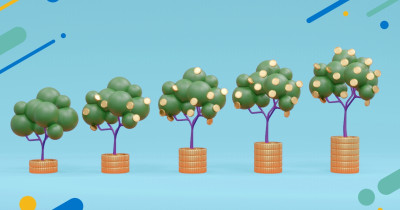10 Things you need to know about debt

Published on 20th March, 2019 at 03:06 pm
Understanding debt is the key to managing your expenses (and lifestyle) more effectively. We’ve compiled some things to help you get started.
1. Not all debt is bad debt
Differentiate between good and bad debt. “With a home loan, for example, you’re likely to benefit from capital appreciation [an asset that increases in value over time], and student debt can be offset by the lifelong earning potential it could bring,” says Danelle van Heerde, head of advice processes at Sanlam Personal Finance. “Exorbitant debt on depreciating assets [something that loses value over time] and unnecessary items are harder to justify.”
Things like store cards (which make it easier to indulge in non-essential items) and payday loans (which typically have very high interest rates) are generally considered bad debt to accumulate.
2. Understand why you have debt in the first place
Are you living above your means? Be honest with yourself – and those around you – that there are some things you’re unable to afford right now.
“Avoid ‘emotional purchases’,” says Jyoti Gopee-Mothie, a financial planner at Pinnacle BlueStar. “Assess your emotional state before purchasing a new pair of shoes or a new tech item. Usually these purchases are to fill an area of emptiness, and while the new purchase does temporarily improve your emotional state… the happy-high wears out.”
3. The more debt you build up, the more money you waste
“It’s frightening how few people realise the money they waste each month on debt servicing costs,” says André Wentzel, solutions manager for Recurring Savings at Sanlam.
“If you are first going to repay any debt, try to increase the repayment amount. And, if you are struggling to put money away at the moment, the best time to start is when you get an increase [or a bonus, or any other type of monetary windfall]”.
4. Know your budget
“Keep track of your spending. If you know where your money is going, it will be easier to make changes if you need to,” says Jaco van Schalkwyk, a certified financial planner at Plan-B BlueStar.
“Find what works best for your individual circumstances. Do you prefer using your banking app or a spreadsheet to keep track of your expenses? Whatever works for you, use it to identify where money is flowing to.”
Next, make a list of all your monthly financial commitments (groceries, school fees, medical bills, petrol or travel costs, rent and so on). Ensure that your salary is enough to cover all these expenses. If it isn’t, consider what you can cut – you need to keep your expenses lower than your income. Anything left over is all you have to use for ‘niceties’ for the month, but ideally, should go into savings or act as a buffer for unexpected costs.
Avoid borrowing money for non-essentials, like a new pair of sneakers or a holiday. Get financially stable first – you can benefit from those luxuries when you are more secure. It’s a small price to pay for financial freedom.
5. Pay back debt in a smarter way
“If your budget only allows you to pay a small amount towards your debt, split the amount smartly. Make a list of all your debt, from the highest interest rate to the lowest interest. It may make sense to pay down debts with the highest interest rates first, and perhaps the smallest debts, which can be paid easily,” says van Heerde. Click here to speak to a financial planner.
6. Cash is king
“If there is no good reason to make a big-ticket purchase immediately, why not save up for it over time instead of buying it on credit?” asks van Heerde.
“During this time, it also gives you additional opportunities to shop around. Once you have saved enough, you may actually find you don’t want or need it anymore, in which case, you can decide whether to add this to your other savings or make a different purchase.”
7. Don’t accumulate more debt
If your bank or a retail store offers you more credit – decline! Set yourself the task of paying back your current debt with your debit card or cash. “Avoid using credit to pay your bills,” says van Schalkwyk.
“While it may make things easier now, using credit only increases your monthly payments in the future.” The key here is discipline.
8. If your debt is unmanageable, what can you do?
Start by accessing your free credit report at least once a year to see your status (you’re entitled to one free report per year, per credit bureau).
“Struggling to meet your debt repayments? Speak to your lending institution and ask for a payment holiday or to restructure your debt,” says Lee Naik, chief executive officer of TransUnion South Africa. You can also seek help via the National Credit Regulator (NCR), who can assist with everything from debt counselling to complaints about your credit provider.
9. What about being blacklisted?
If you’re blacklisted, it means that you have failed to pay your previous debt and are now seen as a risk to creditors. Lending institutions like banks or retail stores are unlikely to allow you increased (or new) credit if you’ve been blacklisted.
Even once you settle your debt, your credit profile is tainted and you will remain on a blacklist for between two to five years. This means you cannot apply for new credit, like a cell phone contract, until you have been cleared.
10. Don’t give up
It is normal to look at your debt repayment plan and be shocked at the number of months or years needed to clear your debt. If you have a friend or spouse who is also in debt, motivate each other and do this exercise together, and then meet regularly to check on each other. Don’t give up – and know that you’re not in it alone.
Struggling to manage your debt? Help is here! Click here to speak to a financial planner.
- Compuscan: 0861 5141 31; www.mycreditcheck.co.za
- Consumer Profile Bureau: 010 590 9505; www.cpbonline.co.za
- Experian: 0861 105 665; www.creditexpert.co.za
- TransUnion: 0861 886 466; www.transunion.co.za
- XDS: 0860 937 000; www.credit4life.co.za
Want to learn more?
We send out regular emails packed with useful advice, ideas and tips on everything from saving and investing to budgeting and tax. If you're a Sanlam Reality member and not receiving these emails, update your contact details now.
Update Now







